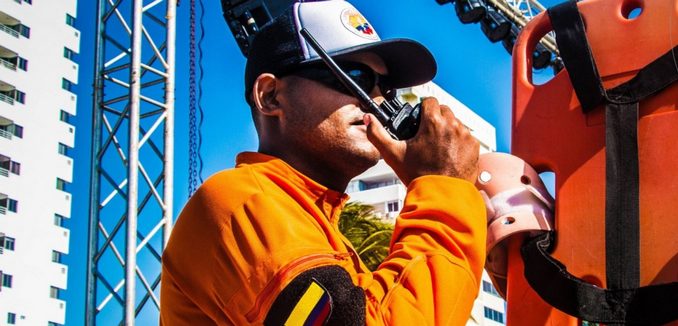Branches of Israel’s United Hatzalah unique localized volunteer emergency response network already operate in countries including Panama, Ukraine and the United States. Now, the grassroots United Rescue Colombia (URC) in South America, modeled after the Israeli initiative, is becoming an official United Hatzalah (UH) branch.
Ambulance response time is too long in Colombia, explained Michael Andorson, the resident who spearheaded the establishment of URC.
“People here are dying every day waiting for an ambulance as the average ambulance response time in the capital of Bogota is 45 minutes. The fact that we are joining forces with United Hatzalah is going to change the lives of a lot of people. This project is so important for Colombia as a country and for the Colombian people,” said Andorson.
The same traffic-congestion problem in Jerusalem is exactly what prompted UH founder and president Eli Beer, in 1989, to recruit neighborhood-based volunteer medics to reach patients quickly by foot or cycle and begin first aid until the ambulance arrives. A registered nonprofit since 2006, UH encompasses 5,000 volunteers across Israel and sends crews to help in other countries following mass casualty events.
Inspired by UH’s model, Andorson began URC independently in the city of Cartagena, with a team of 28 volunteers and five ambucycles – first-aid equipped motorcycles.
“United Hatzalah’s system works. It is a wonderful idea that I saw in Israel and I wanted to implement it here, so I did,” said Andorson. “We are almost at a 3-minute average response time in urban areas where we have a lot of volunteers. We achieve this by combining a network of volunteers from across the city together with the technology and equipment they need to save lives.”
Andorson said the government “looks positively on what we are doing here for the city” and he expects that joining United Hatzalah will help move the project toward the national level.
“I used their model here in Cartagena and we will now work together to increase it and build up the model and the organization around the entire country,” said Andorson.
“The goal is to expand the current operation, which has been running for a few months. Now that Cartagena is operational, we are working on getting teams set up in the capital city of Bogota,” said CEO of United Hatzalah Moshe Teitelbaum, who visited Colombia in early March to work with Andorson.
UH has committed to sending vests, technology and equipment from Israel to the Cartagena and Bogota squads. The goal is to build a network of some 500 volunteers in the capital city while at the same time starting chapters around the rest of the country through recruitment and training of first-responders.
Like all UH branches in Israel and elsewhere, the Colombian units depend on donations to provide emergency medical services free of charge.
Over the past few years, large cities in Brazil, Panama, Argentina, India, Lithuania, New Jersey and Michigan have asked the award-winning Israeli NGO to help them set up similar systems in order to get aid to victims of accidents and illness within three minutes. UH received an award last year from the Panama Homefront Command for the lifesaving aid it has helped provide to the small Central American country.
“Our mission is to save lives wherever needed across the globe. We are happy to partner with the team already established in Cartagena and expand this project much further so that we can provide emergency medical services to all residents of Colombia,” said Beer.
In Israel, UH crews respond to approximately 1,000 calls per day. The organization runs several programs domestically, including a psychotrauma unit, and sends training teams and emergency teams to give assistance around the world.
(via Israel21c)
[Photo: Israel21c ]




